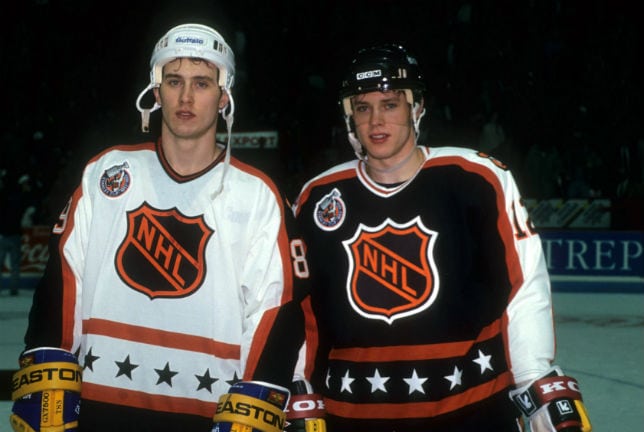
Fedorov believes Mogilny and Tikhonov should join him in Hall of Fame
Sergei Fedorov joins his Soviet national team linemate Pavel Bure in the Hockey Hall of Fame this weekend. All that's missing now, Fedorov says, is the third linemate and the team's dictatorial coach.
 Fedorov believes Mogilny and Tikhonov should join him in Hall of Fame
Fedorov believes Mogilny and Tikhonov should join him in Hall of FameNow that Sergei Fedorov is taking his rightful place in the Hockey Hall of Fame and Pavel Bure was finally inducted in 2012, nine long years after he retired, there is an empty spot that needs to be filled. And next year might just be the time to do it.
Because if Alexander Mogilny is going to find his way into the Hall of Fame, 2016 presents a golden opportunity. For one of the few years ever, there is not a slam-dunk Hall of Famer who retired after the 2012-13 season, so the Class of 2016 is wide open for the likes of Mogilny and Eric Lindros.
And Fedorov, for one, believes Mogilny should be in the Hall of Fame immediately.
“I don’t want to say, like, ‘Absolutely!’ but I really do,” Fedorov said. “He deserves that honor. Alex was faster than all of us and Alex was a machine. He was built like a machine. Plus on top of all the crazy skill he had, he’s better than all of us. He’s amazing.”
Fedorov knows of what he speaks. Along with Bure and Mogilny, he was part of a line that terrorized the Soviet League when all three played for the Soviet Red Army team and might have been the most dominant line in the history of the World Junior Championship. In 1989 in Anchorage, Alaska, an 18-year-old Bure led the Soviets to the gold medal with eight goals and 14 points in seven games. Fedorov had 4-8-12 totals and Mogilny had 7-5-12. That tournament was so full of talent that Bure didn’t even win the scoring title. That belonged to Jeremy Roenick, who had eight goals and 16 points, followed by Mike Modano with 6-9-15 totals.
“I hope my plaque will be next to Pavel,” Fedorov said, “and the next one free for Mogilny.”
One shudders to think of the damage those three players would have done had they stayed home and continued to represent their country in World Championships and Olympics. But the lure to North America was far too great and began when Mogilny made the brave decision to defect after the 1989 World Championship in Sweden. Fedorov made his way out the next year and Bure followed them to the NHL in 1991.
One also shudders to think how good the Red Wings would have been had they ended up with Bure in the 1989 draft. The draft that gave the Red Wings Fedorov, Nicklas Lidstrom, Vladimir Konstantinov, Mike Sillinger, Bob Boughner and Dallas Drake is already considered the best team draft in NHL history. Prior to the Red Wings fifth-round pick, Red Wings chief scout informed former league general counsel Gil Stein the Red Wings intended to draft Bure with the 95th pick. He was informed by Stein that Bure was an ineligible player and if the Red Wings took him, they would lose the pick. So they took Shawn McCosh.
In the interim, Red Wings European scout Christer Rockstrom said he could prove Bure’s eligibility and Smith decided the Red Wings would take Bure in the sixth round, 116th overall. But they were beaten to the punch by the Vancouver Canucks, who took Bure three picks earlier.
Fedorov said all three players were known for their speed, but Mogilny, in his opinion, was the fastest player of them all. “If you went back and forth five times, (Mogilny) will be first,” Fedorov said. “I will be third.”
The money and a chance to play in the best league in the world was a strong pull, but so was the chance to get away from their dictatorial Red Army and national team coach Viktor Tikhonov. But rather than harboring any ill will to Tikhonov, Fedorov feels it’s also high time his former coach received his due from the Hockey Hall of Fame. Fedorov said Tikhonov, who died a year ago Nov. 24, made contributions that cannot be ignored. Like many players who played for him, Fedorov may not have liked Tikhonov, but he has a grudging admiration for him.
“(The problems with Tikhonov) have been blown a little bit out of proportion, in my mind,” Fedorov said. “Any coach in North America, any coach, has to be a difficult person. Because it’s a team sport with 23 characters. Back then in the Soviet Union, you have to win, otherwise you might be going somewhere north in the cold weather.”
Fedorov said at the time, all three of them were just scared teenagers who had no idea of their potential trying to find their way in the game. When asked what he remembers most about playing with Bure and Mogilny, he said, “Not enough. Not enough, we played together.”

